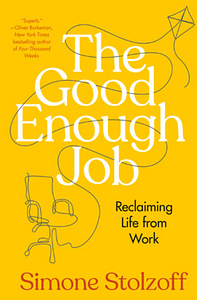Take a photo of a barcode or cover
reflective
hopeful
informative
inspiring
fast-paced
I liked the overall premise of this book and I found it had some compelling albeit cheesy take aways. Some were frankly generic. I found that certain aspects were lacking in depth as far as the author’s critical discussion of how class comes into play here. While he does acknowledge that not all workers, particularly those in the working class or working poor folk, couldn’t aspire to or access the same kinds of time and space needed to achieve this « good enough » relationship to work, I found those moment brief and infrequent. It felt a bit like a shoehorned « yeah I know about this » bit added in to appease dissenters or editors who might have raised the issue. Overall I enjoyed this book and do think it had some worthwhile insights even if these weren’t necessarily new or innovative.
informative
reflective
medium-paced
4.5 — not much new mind blowing info but a good reminder. started a new job in a new industry recently and the work is very different than my previous job & title. i’ve been working hard (haha ironic) to detach my sense of self worth w my job title & company and this book came at the right time for me to once again recognize that i am more than the work that i do and that there’s more to life than just working
There was a lot I enjoyed about this book, from content to structure and tone. Many quotable sections!
I enjoyed re-reading some of the modern parable and koans that I have saved and savored for years - the one about the businessman and the fisherman for example. I enjoyed the case studies from people like Fobazi Ettarh and the term she coined, 'vocational awe,' the quote and meme from TikTok "darling, I have no dream job, I do not dream of labor." This is a well-crafted book, clear in its audience and purpose. The whole book is a pleasure to read (if this is a topic you enjoy, which I do!)
When comparing it to similar in the genre, Out of Office by Anne Helen Petersen and Charlie Warzel, for example, I felt it was less strident and offered more context and depth on the ways in which workism can be insidious. As this book was written 'post-pandemic' it offered less commentary on the physical office/location part of jobs that the Petersen/Warzel.
Here's my "but." The last chapter of the book "A world with less work" has Stolzoff gently chiding himself ... "Here I am, working on a book about the culture of overwork in America on a day that I'm being paid to rest" and it's in reading this sentence that I realize he has spent no time in this entirely well-written book defining and clarifying what is rest, nor has he distinguished between paid work and unpaid work and whether that trips his notion of workism. And this is something that he probably would do well to cover in a book for professionals (like himself) who (might) find great joy in applying their skills in unpaid work. I do think there's a distinction he doesn't quite make clear - for example, how would he treat this situation: Someone who is skilled at writing, and whose paid work is advertising, and who then chooses in their leisure time to also using that skill to increase donations for your favorite charity, or perhaps to write the monthly newsletter for the local Scout troop. Perhaps it will be his second book! Without properly having a definition of rest, removing 'work' from life (For the professional classes he is writing for), does leave a gaping time hole to be filled.
Here's a different kind of parable that metaphorically illustrates what could happen without filling the blank spaces in your house and life - "When an [impulse] comes out of a person, it goes through arid places seeking rest and does not find it. Then it says, ‘I will return to the house I left.’ When it arrives, it finds the house swept clean and put in order. Then it goes and takes seven other spirits more wicked than itself, and they go in and live there. And the final condition of that person is worse than the first."
I enjoyed re-reading some of the modern parable and koans that I have saved and savored for years - the one about the businessman and the fisherman for example. I enjoyed the case studies from people like Fobazi Ettarh and the term she coined, 'vocational awe,' the quote and meme from TikTok "darling, I have no dream job, I do not dream of labor." This is a well-crafted book, clear in its audience and purpose. The whole book is a pleasure to read (if this is a topic you enjoy, which I do!)
When comparing it to similar in the genre, Out of Office by Anne Helen Petersen and Charlie Warzel, for example, I felt it was less strident and offered more context and depth on the ways in which workism can be insidious. As this book was written 'post-pandemic' it offered less commentary on the physical office/location part of jobs that the Petersen/Warzel.
Here's my "but." The last chapter of the book "A world with less work" has Stolzoff gently chiding himself ... "Here I am, working on a book about the culture of overwork in America on a day that I'm being paid to rest" and it's in reading this sentence that I realize he has spent no time in this entirely well-written book defining and clarifying what is rest, nor has he distinguished between paid work and unpaid work and whether that trips his notion of workism. And this is something that he probably would do well to cover in a book for professionals (like himself) who (might) find great joy in applying their skills in unpaid work. I do think there's a distinction he doesn't quite make clear - for example, how would he treat this situation: Someone who is skilled at writing, and whose paid work is advertising, and who then chooses in their leisure time to also using that skill to increase donations for your favorite charity, or perhaps to write the monthly newsletter for the local Scout troop. Perhaps it will be his second book! Without properly having a definition of rest, removing 'work' from life (For the professional classes he is writing for), does leave a gaping time hole to be filled.
Here's a different kind of parable that metaphorically illustrates what could happen without filling the blank spaces in your house and life - "When an [impulse] comes out of a person, it goes through arid places seeking rest and does not find it. Then it says, ‘I will return to the house I left.’ When it arrives, it finds the house swept clean and put in order. Then it goes and takes seven other spirits more wicked than itself, and they go in and live there. And the final condition of that person is worse than the first."
Goddamn — what I would have given to have had this book in college.
I think this is a required reading for everyone aged 16 - 30, to best understand something I didn't fully get until I myself turned 30 last year. A job is a job is a job. It doesn't have to be your full life, or your full personality. That's great if you find work that you find meaning in but, if you're like me, the meaningfulness of the work or the topic area can sometimes lead you to overwork yourself, burn out, and lose track of who you actually are.
Thank you Simone for this book — now, go read it!
I think this is a required reading for everyone aged 16 - 30, to best understand something I didn't fully get until I myself turned 30 last year. A job is a job is a job. It doesn't have to be your full life, or your full personality. That's great if you find work that you find meaning in but, if you're like me, the meaningfulness of the work or the topic area can sometimes lead you to overwork yourself, burn out, and lose track of who you actually are.
Thank you Simone for this book — now, go read it!
informative
inspiring
reflective
fast-paced
There are very few books among those I’ve read that I’d consider perspective changing/life-altering. This is one of them.
Stolzoff draws on American history and retains interest through chapters based on the lives of individuals to illustrate his points on how work dominates our time and identity. It would be unfair to call this merely a cautionary book about hustle culture. Many other books have done that. Rather, it discusses the cultural challenges to pivoting away from a work-centered life, the effect of perfectionism, and the draw of the “I’ll finally be happy when…” effect. Importantly, he discusses the role of capitalism in creating the difficulties individuals face in workaholism.
In short, this is an essential read for anyone who struggles with work-life balance as well as those who struggle to create/recognize an identity outside of work.
Stolzoff draws on American history and retains interest through chapters based on the lives of individuals to illustrate his points on how work dominates our time and identity. It would be unfair to call this merely a cautionary book about hustle culture. Many other books have done that. Rather, it discusses the cultural challenges to pivoting away from a work-centered life, the effect of perfectionism, and the draw of the “I’ll finally be happy when…” effect. Importantly, he discusses the role of capitalism in creating the difficulties individuals face in workaholism.
In short, this is an essential read for anyone who struggles with work-life balance as well as those who struggle to create/recognize an identity outside of work.
hopeful
informative
reflective
medium-paced
informative
inspiring
reflective
medium-paced








